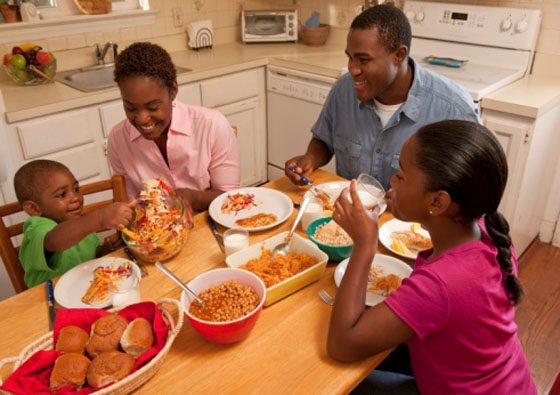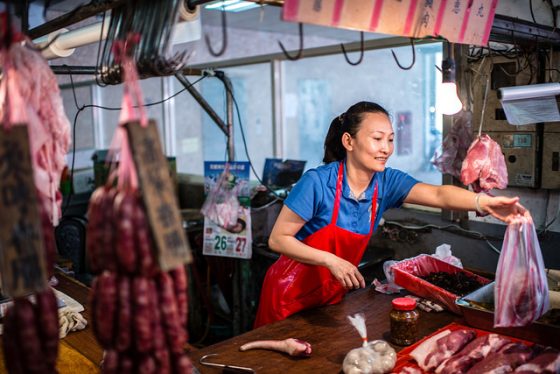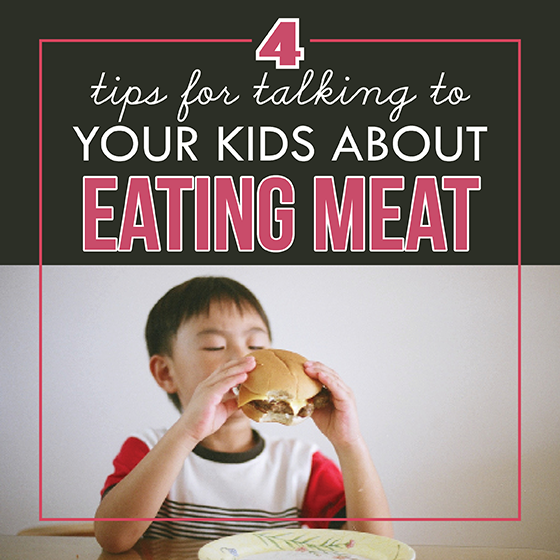One evening at the dinner table your child will inevitably ask where food comes from. The mashed potatoes and green beans are easy to explain, and no parent gets nervous discussing produce farms or vegetable gardens. It’s the other part of the plate that people often feel uncomfortable discussing. That is, the meat part.
Just a few decades ago, more people lived on farms and in rural areas. There wasn’t as much of a disconnect between the farm and your table. It was common for people to know not only the farmer who raised the meat, but also the butcher who prepared it. With more people living in cities, we’ve gotten away from knowing the sources of our food. Most people buy their meat in a grocery store rather than a butcher’s shop or straight from a farmer. But kids are still kids and they have questions about everything, including their food. So if you eat meat in your house, you’ll eventually have to answer the question, “What are pork chops made out of?” or “Where does chicken come from?”
Avoiding the issue of where meat comes from doesn’t make it go away. That being said, meat isn’t something parents should feel afraid to talk about with their kids. Talk to your kids about eating meat the way you’d address any other questions they ask: give honest and straightforward, age-appropriate answers.
Questions about where meat comes from seem to start when kids are around 3 or 4 years old, so start simple and categorize food.
1. Explain that food comes from plants or animals
Give examples such as potatoes and blueberries come from plants, but meat like pork chops come from animals. Explain how the different types of meat you eat at home come from different animals – pork chops come from pigs, chicken comes from chickens, and so on.

According to a recent study conducted at the University of Adelaide in Australia, these conversations commonly happen around the dinner table, so use the meals in front of you to help move the discussion forward. Talk about where everything on the plate came from – beyond the grocery store.
You know your child best, so once the meat question has been asked, how much detail you give should depend on your individual child. Some kids want to know every detail when they’re asking a question, so get ready to buckle down and talk awhile. Other kids are looking for a basic answer and don’t want the entire history of the meat packing industry.
If they’re interested, now is a good opportunity to talk about other food that comes from animals like eggs and milk. It’s good to let kids know that not only meat comes from animals. Other important parts of their diet come from animals too.
2. Recognize the difference between “caught” and farm-raised
By 9 or 10 years old, kids will likely ask more pointed questions about where these animals come from and how they get from a farm to the dinner table. Explain how animals are either raised on a farm or caught. Give examples of animals that are farmed like cows, pigs, and chickens and discuss how some people like to catch their own food – fishing is a great example to start with because it’s familiar to most kids.

At this age, it might be appropriate to have a discussion with some kids about the ethical treatment of animals and factory farms. Your family’s beliefs on the subject and your child’s questions and understandings obviously affect what this conversation should look like. For some kids it may be too early to tackle such a heavy subject, so it may be more appropriate to wait a few years. For other kids, discussing the treatment of animals and how it’s important to understand that these animals die so that we can eat meat may be appropriate.
3. Tell the Truth
At whatever age you’re having this discussion with your kids, don’t lie to them. Don’t gloss over the fact that meat comes from an animal. Don’t tell them that killing an animal doesn’t hurt or that they’re not killed until they’re “ready to die.” You don’t have to give every detail if you aren’t comfortable with that or if you think your child’s too young to understand. It is, however, important for your kids to have truthful information, so they can grow up with an appreciation of where their food comes from and what it takes to put food on the table.
4. Accept Their Reaction
Once you’ve answered their questions and had discussions, be accepting of their reactions. Some kids may not be surprised and move right on to the next topic. Some kids might have more questions and want to keep talking about it until they’ve gotten a handle on the whole idea.

And other kids might think the idea of eating meat is gross or wrong or even be unsure of how exactly they feel about it. In this case, or in any of these cases, now is a great time to discuss the idea of vegetarianism, explaining that there are many people in the world who don’t eat meat for varies reasons – religious, health, ethical, or plain old preference.
Your kids might decide that becoming vegetarian sounds appealing and stop eating meat. Sometimes this is an idea that lasts a little while until they can come to terms with a meat-eating diet, and sometimes it’s long lasting. This type of reaction is quite common and there’s nothing wrong with your child trying vegetarianism or becoming a life-long vegetarian!
According to a 2010 survey by the Vegetarian Resource Group, around 1.4 million kids between the ages of 8 and 18 are vegetarian. There are some great online resources for what foods you should include in a vegetarian diet, especially in a growing child’s diet.
Kids are naturally curious, so of course questions about where dinner comes from are going to come up eventually. But talking about meat shouldn’t be a scary thing. Treat how you talk about eating meat like you would any other question your kids ask: stick to the basics unless they are ready for or ask for more information, be honest, accept their reactions and help them work through how they feel if they’re struggling with the concept. You’ll be raising food-conscious kids who appreciate what it takes to put dinner on the table.
To learn more about talking to your kids about being a vegetarian, check out 5 Ways to Explain Vegetarianism to Kids.
Photo Credit: Joseph Choi, U.S. Department of Agriculture, Jorge Gonzalez, Michelle Frick
Sources: The Lead










































